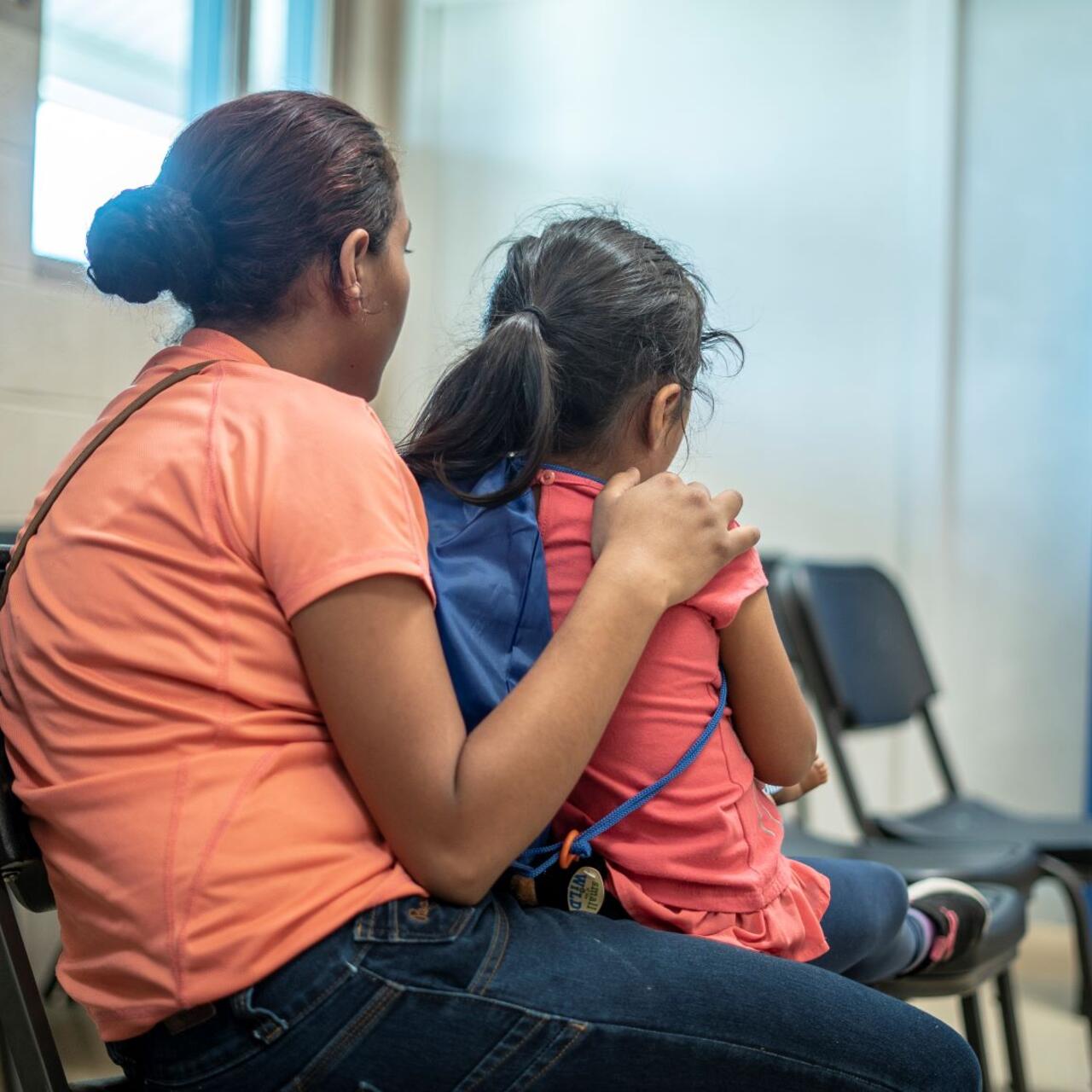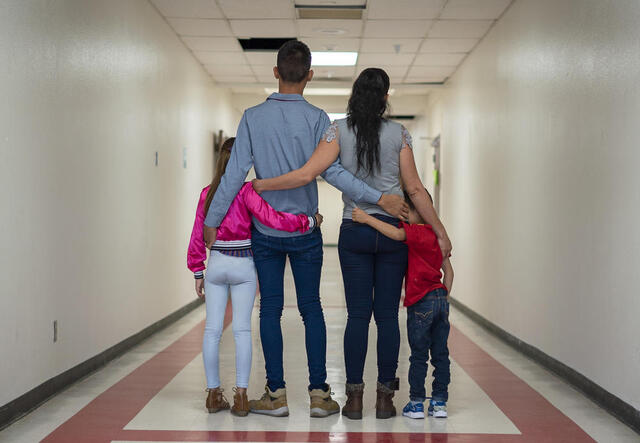
How the Trump Administration is eliminating asylum in the U.S.
Under President Trump, seeking and receiving safety in the United States has become next to impossible.

Under President Trump, seeking and receiving safety in the United States has become next to impossible.
Families arriving at the United States border today have undertaken dangerous journeys to escape persecution and violence. They have the right to request safe haven in the U.S., and should not be criminalized, turned back to harm, or separated from their children as a result. But under President Trump, it has become drastically more difficult both to seek and to receive asylum.
The Trump Administration has put in place, or proposed, a dizzying number of policy changes that threaten the asylum system as it has existed for decades. They have taken steps to restrict who can be granted asylum, to drastically limit whether asylum seekers can stay in the U.S. while their claim is reviewed, and to remove minimum standards for the treatment of children.
Though the courts have stepped in to stop many of these new policies—at least temporarily—seeking and receiving safety in the U.S. has become next to impossible. Find out how the administration has created barriers for asylum seekers—and learn what you can do to make America a safe haven again.
Editor’s note: Although the U.S. election has been called for Joe Biden, the Trump Administration has left an unsafe, unfair and broken asylum system at the U.S. border. Change will be needed on day one of the new administration to save lives and protect families. Take action to tell the administration and Congress to commit to keeping asylum seekers safe and find out all the ways President-elect Biden can make a difference for refugees and asylum seekers.
"I left at 6 o’clock in the morning with my daughter, one suitcase, and a little bit of money.”
— IRC - International Rescue Committee (@RESCUEorg) December 1, 2019
Emilia and her four-year-old daughter fled widespread violence in Honduras to seek asylum in the US. This is their story: https://t.co/SkTobWGBM6
Americans were horrified when news reports surfaced in June 2018 of parents at the border being separated from their children, including babies less than one year old.
These separations happened because of a Trump Administration policy called “zero tolerance.” Under this policy, all adults apprehended at the border were referred for criminal prosecution, with no exceptions for adults traveling with children or those seeking asylum.
A federal judge halted the policy shortly thereafter, but not before an estimated 5,000 children were separated from their parents.
In 2019, the administration announced a proposal that would have violated the core principles of a decades-old settlement called the Flores Agreement. Put in place as a result of a lawsuit stemming from the prolonged detention and mistreatment of Central American children in federal custody in the 1980s, the Flores Agreement requires the government to release children from government custody without unnecessary delay, place children in the least restrictive setting, and implement standards related to the care and treatment of children while they’re in federal custody.
This Trump Administration policy was also blocked in court, in September 2019. The case, for which the IRC joined an amicus brief, is currently pending before the Ninth Circuit court.

Trump Administration policies have left asylum seekers stranded in dangerous conditions in Mexico while they wait to make their case.
Through a process called “metering,” the administration has placed an arbitrary daily limit on the number of asylum seekers allowed to present themselves to U.S. authorities at official ports of entry along the U.S.-Mexico border. This policy has forced some to wait weeks and even months in border towns in Mexico to submit their request.
Under a different policy, known as the Migrant Protection Protocols (MPP) (or “Remain in Mexico”), others are sent right back to Mexico even after they are able to make their claim to U.S. border officials. They then have to wait there until their case can be heard by an immigration judge in the U.S. This change has made it much more difficult for those seeking safety to have a fair review of their claims, something they are entitled to under the law. One study found that only 0.1% of asylum seekers affected by MPP were eventually granted asylum.
Parents interviewed in shelters at the U.S.-Mexico border reported their children to be at risk of kidnapping, gang recruitment, physical violence, and sexual abuse
Both policies have forced families to wait in unsafe conditions. To date, over 60,000 individuals have been sent back to wait in Mexico. An International Rescue Committee assessment found that parents interviewed in shelters at the U.S.-Mexico border reported their children to be at risk of kidnapping, gang recruitment, physical violence, and sexual abuse—in particular when they are in transit or in the border town. These dangers have reportedly increased as asylum seekers sent back to Mexico are targeted for kidnapping and assault, including in airports and bus stations as they try to find a safer place to wait or return for their asylum hearings.
“Remain in Mexico” was recently briefly blocked by the Ninth Circuit Court (before a three-judge panel allowed it to temporarily continue) and many affected by the policy remain in harm's way. Metering remains in effect today.
The Matter of A-B is a case named after the initials of a Salvadoran woman initially granted asylum in the U.S. after enduring more than a decade of abuse by her ex-husband.
In June 2018, then-Attorney General Jeff Sessions made the rare decision to intervene in this case. The opinion Sessions issued, which is now binding on all immigration judges in the U.S., dug away at a decades-long precedent that allowed victims of domestic violence to be eligible for asylum. While domestic violence survivors may still claim and be granted asylum in the U.S., this decision has made the evidentiary burden much higher—that means more of their cases are being denied.
This decision in The Matter of A-B continues to threaten the fate of asylum seekers fleeing gang violence, severe domestic violence, and other forms of generalized violence. While many of these claims were previously heard on their merits, more are now being dismissed outright.
Gender-based violence has reached catastrophic levels in many of the countries that asylum seekers are fleeing. In Guatemala, the homicide rate for women is more than three times the global average, and in El Salvador it is nearly six times. In Honduras, it’s one of the highest in the world—almost 12 times. A woman is killed in the region every six hours.
Gang violence also threatens the lives of many in Central America. Valentina, a woman who was resettled in Texas after fleeing gangs in El Salvador, told the IRC, “In El Salvador, you don’t know if you’ll make it home alive at the end of the day.”
The Trump Administration has made numerous attempts to bar specific groups of people from seeking asylum.
First, in November 2018, President Trump issued a proclamation that, in combination with other rules, barred anyone from seeking asylum if they entered the U.S. from Mexico between official ports of entry.
The law is clear that how an individual enters the country does not impact their ability to seek asylum. The Supreme Court upheld a lower court ruling blocking this first asylum ban.
The administration tried again in July 2019 by issuing a policy banning people from seeking asylum if they traveled through any other country and did not apply for asylum in that country first. With limited exceptions, this applies to all asylum seekers who have traveled through Mexico to reach the U.S.-Mexico border and not sought protection in Mexico or another country. This policy remains in effect today, though it too is making its way through the federal courts.
In December 2019, the administration proposed greatly expanding the list of those barred from asylum eligibility on the basis of minor involvement in the criminal justice system that goes far beyond the “particularly serious crime” exceptions outlined by the 1951 Refugee Convention. This policy amounts to an unnecessary and overly-punitive overhaul of U.S. asylum protections.
Between July and October 2019, the U.S. signed “asylum cooperative agreements” with Guatemala, Honduras, and El Salvador, the countries that make up the Northern Triangle of Central America.
The agreements allow the United States to return asylum seekers to those countries regardless of what their country of origin may be, instead of allowing them to apply for protection in the U.S. On top of denying asylum seekers their rights, these agreements send people in search of safety to dangerous, insecure, and potentially unfamiliar places. An asylum seeker from El Salvador could be sent to Guatemala, where they may have no ties, with little hope of recourse.
Many asylum seekers who arrive at the U.S. border have undertaken the journey precisely to escape violence in Northern Triangle countries. These are not "safe third countries." In El Salvador, one woman was murdered every 20 hours in 2018. One asylum seeker from Honduras told the IRC, “All you can do in Honduras is shut your mouth because nobody is safe there.”
In January 2020, the ACLU and other organizations filed a lawsuit that argues that these agreements violate U.S. law by denying asylum seekers access to the right to seek protection through a “full and fair procedure” and potentially returning them back to countries where they could be persecuted. The agreements are currently in effect while litigation is ongoing.
If an asylum seeker is finally able to enter the United States, they may find themselves priced out of seeking safety.
In November 2019, the Trump Administration proposed a rule that, if enacted, would make the U.S. one of only four countries worldwide that charges people fees for asylum.
In the U.S., the IRC is helping meet asylum seekers’ basic needs, connecting them to legal and mental health support, and reuniting families. The IRC is also supporting local partners in Mexico to aid migrants and asylum seekers stuck in border towns, and supporting programs that work with women and girls who have experienced violence by increasing access to services such as medical care. Donate today to support our work.
You can also call your representative today and tell them that expelling asylum seekers must end.